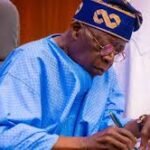In his latest submission, Renowned Political Economist and Commonwealth Institute Director, Prof. Anthony Kila mocks the battle between the EFCC and former Governor of Kogi State, Yahaya Bello. He queries the role of the IGP, Security Detail and the endless praise singers and defenders of the politicians in this drama that ensued in Abuja.
Dear Readers
The subject of today’s epistle is an afterthought. It is an unplanned event that, like trouble, forced itself into our plan, it came without invitation and brought its own chair to sit without asking if we have space for it. If this sounds metaphorical to you, it is because you were not in Abuja on Wednesday 17th April 2024, trust me, it was literal to residents and those that had reasons to go through the Wuse zone 4 area of Abuja. The normally serene area turned to a stage of sheer drama filled with noise, songs, fear, mob and armed warriors loyal to warring factions. We later got to know that the drama of the day was a Kogi’s dance in Abuja. My first instinct whilst finding a peaceful corner to mind my business, was to pray that “may we not choke on what we did not eat…”
Kogi’s dance in Abuja had three warring factions, performers on one side were the Eagles Soldiers dressed in black, made up of operatives of the Economic and Finance Crime Commission (EFCC), on the other side were two groups made up of armed policemen and unarmed but fierce militia representing the past and present Governor of Kogi state. Alhaji (Dr) Yahaya Adoza Bello CON also known as the “White Lion” and Alhaji Ahmed Usman Ododo. I don’t think Ododo has a doctorate yet nor has he got a national honour but let us give him time…
The trophy of the day was the White Lion. EFCC warriors wanted to take the White Lion away to get him to explain why he took and ate some meat that he was not supposed to have touched. The meat he took according to the EFCC is worth about N84bn fraud. The White Lion would not yield to go with them and Ododo agreed with him. A man that backs his support with action, Ododo did not just support from afar morally and spiritually, he did not just send capable troops to the field. He personally went to the field himself to battle for the White Lion. Ododo’s appearance on the stage of battle was exhilarating; the crowd cheered, guns were fired, moves were made and, in the end, Ododo, we are told, won the day and took the White Lion away. EFFC operatives left with nothing. They promised to be back, I guess they remembered the eagle’s image on their outfit for after they left the scene with nothing they resorted to tweets, but do eagles tweet? Clearly, the White Lion of Kogi is not Bobrisky…
The first account of most news outlets in the country was to report the event as a siege laid by EFCC to the home of Yahaya Bello. Allow me to say on behalf of those of us who think every report should follow clear set of rules and contain as well as answer a minimum number of questions that we are not impressed. Our editors can and should do better. Our news room missed an opportunity to tell readers what the EFCC was doing? Was Yahaya Bello resisting an arrest or an invitation? Editors also missed the chance to inform readers and viewers on why and how EFCC was at Yahaya Bello house. Dear Editors, please let us go back to the basic rule of making sure every story answers the “who”, “what” “why” “when” “where” and “how” questions.
Kogi’s dance in Abuja was held in Wuse but it calls into question the Inspector General of Police too. Clearly, it is time we have a conversation (another conversation) about the role of policemen and other security officers attached to past and serving governors. What exactly is their role? Beyond protecting these governors from been assassinated by criminals or overwhelmed by the mob. Are they allowed to resist arrest? It is easy to see why security aides that spend so much time of the day with governors and past governors and get so much perks from them can be loyal to those that they protect, it is just human. Beyond the human angle though, is there a set of rules, code of conduct or protocol that establish the supremacy of the state and law in case of conflict of interests? Do we have in place a set of procedures to deploy in cases where the governor goes rogue? What are the implications for officers that aide resistance of arrest or conspire to violate the law? Is there a chain of command that can aid the law and its officers in cases where a governor decides to break the law or turn against the officers of the law?
During the Kogi’s dance in Abuja, there was a lot of hailing and cheering for the governors in battle, who are these extras that came to dance? I doubt they are employed citizens making or trying to make their honest living. My bigger concern is that will such people, so used to playing extras, beggars and shouters be ever be able to learn a trade or keep a job? Many of them were young, I doubt there enjoy the kind of life style or have access to the aspirations of the families of their Excellencies, Distinguished and Honourable, yet they are children of some people too. Zimbabwean born economist, Wellington Garikai Bonga, of the Liverpool John Moores University wrote a paper, published in 2003, that investigates the “weaponization of poverty” using the case of Zimbabwe. Sadly, Nigeria has too much to offer here too.
Special greetings to the people of Kogi the land of young governors…








